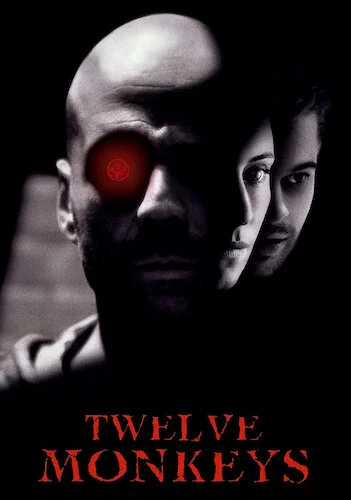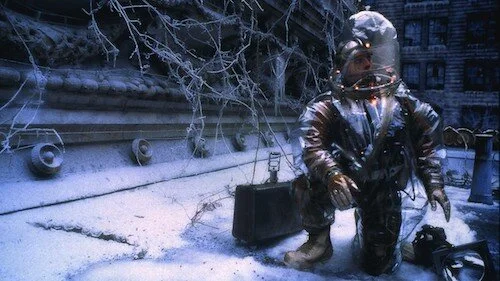12 Monkeys: On-This-Day Thursday
Written by Andreas Babiolakis
Every Thursday, an older film released on this opening weekend years ago will be reviewed. They can be classics, or simply popular films that happened to be released to the world on the same date.
For January 5th, we are going to have a look at 12 Monkeys.
One of the greatest short films ever — which I will be getting more into with the July Best 100 Short Films of All Time list I’m working on — is Chris Marker’s La Jetée, which defies what it means to be a motion picture. Told mostly through still photographs (outside of one beautiful, metaphysical moment), the film likens the sentimentalities of memories and mementos to the urgencies of wanting to go back to a world before an apocalyptic state. It’s the kind of science fiction picture that redefines the genre through and through; it went one step ahead and reimagined the medium as well. It’s impossible for a film like this to not be inspirational, and a strong mind like Terry Gilliam was bound to be influenced enough to want to make his own say on the narrative. However, he’s also clever enough to not simply remake the film and lose any sense of life the short film possesses.
Instead, Gilliam derived ideas from the source material and created a bit of a new story from within it. 12 Monkeys is a fuller depiction of the world Marker created. It’s an effort to rewrite histories and rediscover new information from our past, all through time travel. Of course, as I’ve said before and will say until I die (I’m sure), time travel narratives in film are bound to be finicky and debatable to varying degrees, so I will not take into account how “possible” the methods of time travel in 12 Monkey is. I’ll just be there for the ride when it comes to that aspect of the film. What I can comment on is the dystopia and different timelines Gilliam has crafted, and they’re quite well done. You do get the sense that you are entering new dimensions each leap, even though we’re witnessing the same world going through different phases. Although 12 Monkeys is a bit of a game of chess, I’m all for it; time travel films without stuff you miss the first time aren’t exploiting their mechanics properly. Within a hectic landscape, 12 Monkeys makes the most of its anarchy down to the pseudo linearity of the picture.
As creative as the film is narratively, 12 Monkeys is also a sight to behold.
Outside of Brazil, I can’t think of many Gilliam films I like enough to love, but 12 Monkeys is certainly one of the closest contenders of his. It’s a rare time where his manic form of filmmaking matches the subject matter, which means Gilliam did a lot of work making the film his own (La Jetée is the complete opposite of manic). Whether you’re changing timelines, on the run, or cooped up in an asylum, 12 Monkeys has an energy about it that is far from atypical for Gilliam. The good news is that it also has a lot of grace: something I feel a few Gilliam films forget about. Maybe it’s Marker’s initial beauty in his short that Gilliam was channeling? The casting also helps. We have a Bruce Willis in his prime (trying to do the dramatic thing, but forever great at the action thing), a compelling Madeleine Stowe (who is also at her peak), and Brad Pitt ready to break out into the upper echelons of acting (which he clearly did, and he earned his first Academy Award nomination here).
The stars lined up for old Gilliam with 12 Monkeys, but it’s his proper execution that has made the film one of his better features. Even with something as fragile as a time travel picture, Gilliam covers all bases here. The pacing is always even. The purpose of the film never gets lost. Gilliam doesn’t succumb to his strange antics. It’s a balanced film that clearly has staying power, either through its spinoff television series or its pop culture legacy. Gilliam does have the ability to remain in the annals of cinematic trendiness (Fear and Loathing in Las Vegas exists), but 12 Monkeys is a ‘90s film of his that I feel has earned that spot. It’s an adaptation where a filmmaker was inspired to create, not to steal. It’s honestly a nice change of mindset I wish more adaptations would have.
Andreas Babiolakis has a Masters degree in Film and Photography Preservation and Collections Management from Ryerson University, as well as a Bachelors degree in Cinema Studies from York University. His favourite times of year are the Criterion Collection flash sales and the annual Toronto International Film Festival.






